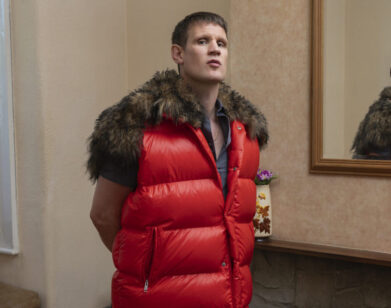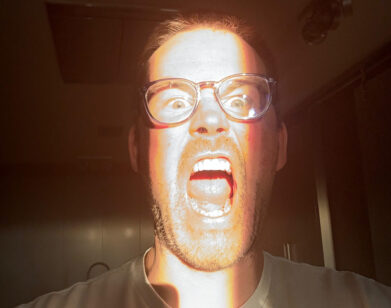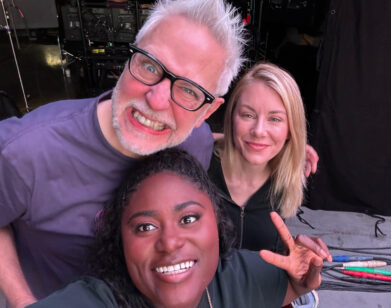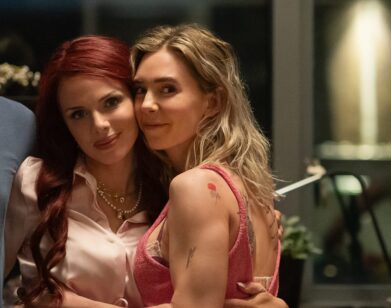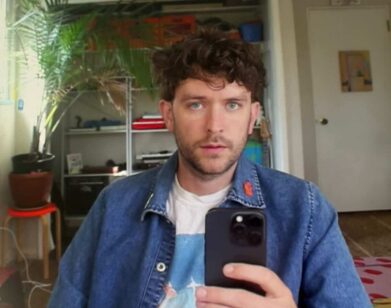Joshua Leonard Tells Some Truths
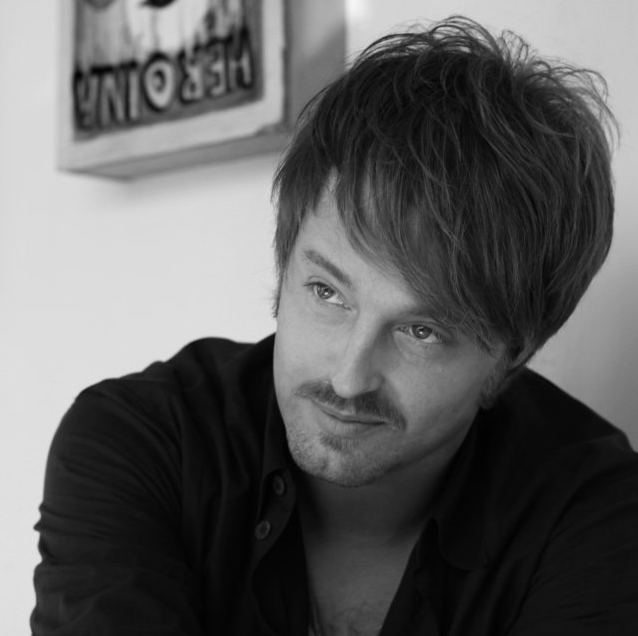
ABOVE: JOSHUA LEONARD. PHOTO COURTESY OF ERIN ANDREW
Actor Joshua Leonard first cut his teeth as Josh in The Blair Witch Project 13 years ago. With many roles since, as well as having co-directed the 2008 documentary Beautiful Losers, Leonard’s most recent project The Lie is his narrative feature directorial debut. He stars as Lonnie, a likable but misdirected husband and father who, experiencing a thirtysomething crisis, tells his boss his baby died so he can get out of work. Sporting a trim beard, a couple of animal tattoos and a denim outfit, we spoke with the blue-eyed filmmaker in the Interview offices a few days before the premiere.
VOLLMER: The lie in The Lie is a horrible lie. Why did you hang your film on a lie so difficult to stomach?
LEONARD: First of all, we can’t take credit for all the moral reprehensibility, because it is based on this T.C. Boyle story. But what’s interesting when you talk to audience members is how that is the line in the sand. I’ve talked to people who’ve freely admitted that they lied about either one of their parents dying or having heart attacks or aneurysms to get out of writing papers or going to school, but never this. Which must be some kind of superstition? I don’t know.
VOLLMER: The Lie is a serious film, but it doesn’t take itself too seriously. How did you strike a balance between the two?
LEONARD: There should be some self-awareness when you’re making a movie about the existential crisis of middle-class white people in their 30s. Relative to many parts of the world, we’re lucky to have these problems. They’re still problems, they’re still what we spend most of our days and nights grappling with, they’re no less real, but we’re not getting shot at on a day-to-day basis, and we’re not struggling to put food on the table. I think part of what I like when I go to see movies that take place in this generation and are kind of designed for my peer group is that there’s a story in there that can have some levity to it, that can not take itself too terribly seriously.
VOLLMER: Taking responsibility is one of the big themes in the film—
LEONARD: Absolutely. I don’t know about everybody else’s experience, but around the time most of my friends were hitting 30, there seemed to be a Jonestown-massacre level of flight into marriage and parenthood. All of a sudden, everybody I knew got married and pregnant. Especially in Los Angeles, it’s easier to appear like you have a domestic life because so many of us have little bungalow houses on safe-looking streets and it feels more family-friendly. I think what we tried to do with the treatment of Los Angeles in the film was—there are so many different Los Angeleses, and the one that I’ve always been most attracted to is the way that Pet Sounds makes you feel, or what you see when you read Joan Didion. That kind of sunburnt, lonely, random sprawl. I find that to be one of the most fascinating things about Los Angeles; in a town [where the] business is entertainment and celebrity, there’s such a massive level of anonymity in the culture there. We’re secluded in our cars; I can go days without interacting with anyone else. There’s a real texture of loneliness.
The lie that Lonnie tells is what drives the plot along, it’s what drives a lot of the dark humor, I think, but it’s also meant to be more of a placeholder for the systemic lies in this couples’ relationship. Lonnie and Clover are a couple like most in our peer group, who are not starving, not thriving, faced with the burden of sudden adult responsibilities due to the birth of their baby daughter, and in that time in their life where they’re trying to find balance between the ideology of their past and the responsibility of their present and how to rectify those two things. I think for those of us whose first cognizant memories were of the rejection of the Reagan ’80s and then really cut our teeth on the apathetic ’90s, I think a lot of us wake up and find ourselves in adulthood and don’t really have the tools to adapt to it with any grace.
VOLLMER: So what was it like to direct yourself at acting? Have you done that before?
LEONARD: No.
VOLLMER: Would you do it again?
LEONARD: I would do it again, but only in very specific instances. With my next film, I’m not going to be in it, and I cannot wait, because part of the appeal of directing is sitting behind a monitor and not showering and gaining 20 pounds and wearing a baseball cap all the time, and I didn’t get to do any of that on this one.
The first thing that appealed to me when I read the story was Lonnie’s character, and sometimes you just read about somebody and you have a deep empathy for them. And on the surface, the guy does some pretty despicable things. And I often think, when I’m playing a character, I am the defense attorney for that character, and I’m there to bring out the motivations and the subtext in a way that, at the very least, humanizes them.
I also can’t take for granted the fact that basically the entire cast and crew were people that I knew and/or loved and/or had a previous working relationship with before. So this was a very different situation than stepping into an anonymous crowd of people and trying to find that balance. Because I knew that my producing partner Mary Pat Bentel, our DP, Ben Kasulke, who I worked with on Humpday, Jess, Mark, all the other actors—I knew they had my back. I knew I could always turn to any of them when I reached the point of diminished objectivity, and go, “Did that suck?” And they’d be honest with me. And I knew because we were paying them two dollars, that everybody was in it for the right reasons and really, at least creatively, had a vested interest in making the best product that we could.
VOLLMER: Did you feel that you were taken out of the world of the actor when thinking about the direction?
LEONARD: Oh, all the time. But I expected that. I think it was actually harder on the other actors, because we improvised so much of the dialogue. I would be in an intense scene with Jess and we would be shooting two cameras at the same time, so it would be covering both sides of the conversation, and I would say, “Can you say that again?” And she would think that I was improvising and would refer to me as my character’s name and say, “No, Lonnie! I’m not gonna say—” We had to come up with code words so I could tell her when I was speaking as the character and when I was speaking as the director.
VOLLMER: She did such a great job, by the way, especially in that scene at the end where she goes through that whole range of emotions—
LEONARD: Jess has such mad talent that she’s able to give you every detail of what this character’s thinking without saying a thing.
VOLLMER: One of my favorite moments in the film is when you say, “My music sucks!” and your character’s wife says, “Yeah, it does suck.” Did you write the “Soul Crushers” song your character sings?
LEONARD: I co-wrote it with my buddy Christian Stone, who was in the Campfire Girls and is now in Lonely Trees. I did the lyrics and he did the tasty ’90s guitar riffs and the tambourine.
VOLLMER: Was it really fun to say, “Let’s write a horrible song”?
LEONARD: It’s a hard question to ask your friend who’s actually a talented musician. You’re like, “Hey, would help me write a song for my movie?” And he’s like, “Yeah, I’d love to.” And I’m like, “The caveat, though, is that has to be really bad.” He’s like, “Fuck you, dude.” [both laugh]
VOLLMER: Hilarious. You co-directed the documentary Beautiful Losers. It seems that this movie is also about beautiful losers in some ways. Do you see any connections between the two projects?
LEONARD: I think, for better or for worse, the characters I respond to and the stories I respond to are about the beauty in chaos and the notion that humanity and fallibility always co-exist in the same space. I find, especially in mainstream movies, that you meet these characters whose greatest flaws in life are like job-interview flaws, like caring too much or working too hard. Whereas what’s much more resonant for me, and the folks that I love, is that when we fuck up, we really do fuck up. And it’s often selfish, and it’s often fear-based, and it doesn’t make you a bad person. But there’s shrapnel spray and folks get hurt, and that doesn’t have to end a relationship. I like the notion of at least aspiring to telling stories about people with real flaws and real redemption, that they have to work to earn because they screwed up. You don’t judge your characters, but you don’t let them off the hook either.
VOLLMER: You had an unconventional childhood. You dropped out of high school and volunteered in Mexico. Did any of those experiences inform your film career?
LEONARD: I feel like having a bit of a wayward youth helps me to have a different level of empathy for characters and stories that, if I had been more of a winner or more of an A-type, I wouldn’t be attracted to. And that’s a huge part of what I spend my days thinking about and caring about, so I think that’s a big part. On some level, I will always feel like I’m standing just outside the club. And I think that, hopefully, the benefit of adulthood is that you get to a point where you come to terms with that and you start introducing yourself to people who are also standing outside of the club around you. And you realize that’s a fine place to hang out, too.
THE LIE IS OUT TOMORROW.

